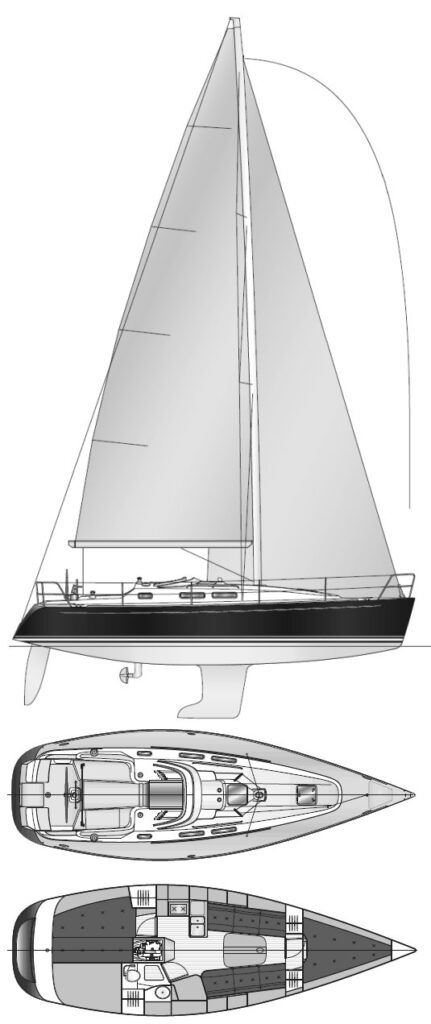The Finngulf 331 stands as a testament to Finnish boatbuilding excellence, embodying Finngulf Yachts' commitment to crafting high-quality performance cruisers. Launched in 2003, this monohull sailboat was designed by the acclaimed naval architect Karl-Johan "Kamu" Stråhlmann, known for his instrumental role in shaping many of Finngulf's popular models. Conceived as a versatile vessel, the Finngulf 331 aims to provide a solid and capable platform for both comfortable coastal cruising and more ambitious offshore passages, appealing to discerning sailors who prioritize robust construction and excellent sailing characteristics.
Finngulf 331 Information, Review, Specs

- Make
- Finngulf
- Model
- 331
- Number Built
- Production Year(s)
- 2003 - ??
The Finngulf 331's production commenced in 2003, building upon Finngulf Yachts' established reputation for durable and high-performing sailing yachts. The builder, Finngulf, founded in Finland in 1981 by Stig Nordblad, dedicated itself to constructing vessels primarily between 10 and 14 meters in length, consistently employing GRP (Glass Reinforced Plastic) with foam core for superior strength and insulation. This manufacturing ethos carried into the design of the 331, ensuring a robust hull structure.
Karl-Johan "Kamu" Stråhlmann, the naval architect behind the Finngulf 331, aligned his work with Finngulf's "FG Performance" philosophy, aiming to capture the "spirit and essence of each individual yacht". His designs for Finngulf yachts, including the 331, sought to blend performance, seaworthiness, and comfortable cruising attributes, appealing to owners who valued a handcrafted approach and unwavering quality. A notable variation is the availability of a shoal draft version, offering a shallower draft of 5.4 feet (1.6m) compared to the standard 6.07 feet (1.85m), and the model is also known as the Finngulf 33.
Sailing Performance and Handling
The Finngulf 331, with a length overall of just over 33 feet and a waterline length of 30.38 feet, demonstrates capable sailing performance. Her sail area to displacement ratio of approximately 18.98 indicates a vessel that is responsive and likely to perform well across a range of wind conditions, including lighter airs. The ballast to displacement ratio of around 0.385 suggests a stable and stiff boat, capable of standing up to more significant wind pressures and providing a comfortable motion in a seaway. With a displacement to length ratio of approximately 391.55, the Finngulf 331 falls into the category of a heavier, more traditional cruiser, emphasizing stability and seaworthiness over extreme light-displacement speed. Owners have generally praised the 331's sailing characteristics, highlighting its capable nature.
Accommodations and Layout
The interior of the Finngulf 331 is designed for comfortable cruising, typically featuring a functional two-cabin layout. The craftsmanship is a standout feature, with interiors often described as hand-built and featuring satin-varnished mahogany, contributing to a sense of high quality and traditional marine elegance. Reviewers and owners have often compared the interior quality favorably to that of much larger, prestigious yachts. The typical arrangement includes a V-berth forward, a main salon, a galley, a head, and a quarter berth or aft cabin, providing a versatile six-berth interior. While specific headroom figures are not consistently published, the overall impression is one of a well-appointed and comfortable cruising environment.
Owner's Perspectives
Owners of the Finngulf 331 consistently express satisfaction with the boat's high-quality interiors and robust construction. The vessel's general reliability and enduring quality are often cited as key strengths, fostering a dedicated owner community. While specific widespread issues are not commonly reported, some owners have noted a tendency for wave slapping in the aft cabin when anchored stern-to-wind. One owner also reported an issue with an in-mast furling mainsail requiring winching out. However, these appear to be isolated or manageable concerns, not detracting significantly from the overall positive ownership experience.
Measurements
Construction & Hull
- Construction Material
- Fiberglass (Solid)
- Hull Type
- Monohull Sailboat
- Keel Type
- Bulb
- Rudder
- 1x Spade
- Ballast
- 4233 lbs
- Displacement
- 10979 lbs
- Water Capacity
- 32 gal
- Fuel Capacity
- 21 gal
Engine
- Engine Make
- Volvo Penta
- Engine Model
- —
- Engine Type
- —
- Engine HP
- 28
- Engine Count
- 1
- Drive Type
- —
- Fuel Type
- Diesel
Rig & Sails
- Rig Type
- Fractional Sloop
- P (Main Luff)
- 42.32 ft
- E (Main Foot)
- 14.76 ft
- I (Foretriangle Height)
- 45.28 ft
- J (Foretriangle Base)
- 12.14 ft
- Forestay Length (est)
- 46.88 ft
- Main Sail Area
- 312.32 sqft
- Foretriangle Sail Area
- 274.85 sqft
- Total Sail Area (Reported)
- 587 sqft
- Total Sail Area (Calc)
- 587.17 sqft
Dimensions
- LOA
- 33.23 ft
- LWL
- 30.38 ft
- Beam
- 10.83 ft
- Draft
- 6.07 ft
- Max Headroom
- -
- Air Draft
- 51.85 ft
Calculations
- Hull Speed
- 7.39 kn
- Pounds per Inch Immersion
- 1